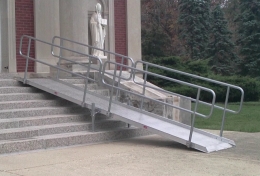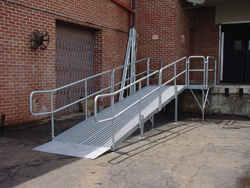Americans with Disabilities Act Law and Effects
 Though it has been nearly a quarter of a century since ADA was signed into law, many municipalities across the United States have effectively used a ‘grandfather clause’ mentality to resist adaptation. Their belief that pre-existing infrastructure is exempt from the law has kept many government buildings from adapting to the disabled.
Though it has been nearly a quarter of a century since ADA was signed into law, many municipalities across the United States have effectively used a ‘grandfather clause’ mentality to resist adaptation. Their belief that pre-existing infrastructure is exempt from the law has kept many government buildings from adapting to the disabled.
Many city services have also remained inaccessible due to a loophole in the law. As it stands, ADA does not require cities to make every facility or program accessible. Instead of physically altering a structure to conform to the needs of the disabled, a municipal government can simply move the location of the meeting to an adaptable setting.
Cities also resist making the proper accommodations to buildings of historical significance, citing the fact that a wheelchair ramp might compromise the integrity or significance of the structure.
An issue that is nearly always overlooked concerns our roadways and sidewalks. City governments often do not provide adequate curb ramps to ensure total wheelchair mobility. ADA law requires new roadways and curbs to include sloped wheelchair access points, however pre-existing roads are not required to adapt.



